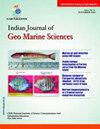气候变化情景下安得拉邦鱼类产量预测的统计和机器学习技术比较研究
IF 0.5
4区 地球科学
Q4 Earth and Planetary Sciences
引用次数: 0
摘要
本研究强调在气候变化情景下,通过不同的统计和机器学习方法预测未来5年安得拉邦的海洋鱼类总产量和商业重要鱼类(即印度鲭鱼、油沙丁鱼、马鲛鱼和小沙丁鱼)的捕捞量。在不同的模型中包括或不包括气候和环境参数的情况下进行预测。模型中使用了外源变量,如海表温度(SST)、风速等气候参数和叶绿素- a、扩散衰减系数、光合有效辐射(PAR)等环境参数。采用非线性自回归(NAR)人工神经网络(ANN) (NNAR-ANN)、自回归综合移动平均(ARIMA)、基于经验模态分解的人工神经网络(EMD-ANN)等模型,在不考虑气候和环境变量的情况下,利用商业重要鱼类的时间序列季度捕捞数据和总捕鱼量进行预测。利用含外源变量的自回归综合移动平均法(ARIMAX)和带外源变量的非线性自回归(NARX)模型,结合环境和气候变量的季度平均数据进行预测。该模型预测了未来20个季度的总捕鱼量和重要商业鱼类的捕鱼量。基于误差度量MAPE (Mean Absolute Percentage error)对模型预测结果进行比较,结果表明NARX模型的预测效果优于ARIMAX、ARIMA、NNAR-ANN和EMD-ANN等模型。执行考虑到气候变化对渔业影响的管理战略将加强可持续渔业,并为减缓气候变化铺平道路。本文章由计算机程序翻译,如有差异,请以英文原文为准。
Comparative study of statistical and machine learning techniques for fish production forecasting in Andhra Pradesh under climate change scenario
The present study emphasizes the forecast of Andhra Pradesh's total marine fish production and the catch of commercially important fishes, viz ., Indian Mackerel, Oil Sardine, Horse Mackerel, and Lesser Sardines for the next 5 years by different statistical and machine learning approaches under climate change scenario. Forecasting is done with and without the inclusion of climatic and environmental parameters in different models. Exogenous variables, i.e ., climatic parameters such as Sea Surface Temperature (SST), wind speed, and environmental parameters such as Chlorophyll- a , diffusion attenuation coefficient, and Photo-synthetically Active Radiation (PAR), were used in the model. The following models like Non-linear Autoregressive (NAR) Artificial Neural Network (ANN) (NNAR-ANN), Auto-Regressive Integrated Moving Average (ARIMA), Empirical Mode Decomposition based Artificial Neural Network (EMD-ANN), are used to predict the fish catch data using time series quarterly catch data of commercially important fishes and total fish catch without the inclusion of climatic and environmental variables. Auto Regressive Integrated Moving Average method with inclusion of exogenous variables (ARIMAX) and Non-Linear Auto Regression with exogenous variables (NARX) models were used to forecast along with quarterly average data of environmental and climatic variables. The model developed predicts the total fish catch and also the catch of commercially important fish for the next 20 quarters. The developed model forecasts are compared based on the error measure, i.e ., MAPE (Mean Absolute Percentage Error), and the results showed that the NARX model outperformed other models like ARIMAX, ARIMA, NNAR-ANN, and EMD-ANN. Implementation of management strategies considering the impact of climate change on fisheries will enhance sustainable fisheries and pave a pathway for the mitigation of climate change.
求助全文
通过发布文献求助,成功后即可免费获取论文全文。
去求助
来源期刊
CiteScore
1.50
自引率
0.00%
发文量
0
审稿时长
1.7 months
期刊介绍:
Started in 1972, this multi-disciplinary journal publishes full papers and short communications. The Indian Journal of Geo-Marine Sciences, issued monthly, is devoted to the publication of communications relating to various facets of research in (i) Marine sciences including marine engineering and marine pollution; (ii) Climate change & (iii) Geosciences i.e. geology, geography and geophysics. IJMS is a multidisciplinary journal in marine sciences and geosciences. Therefore, research and review papers and book reviews of general significance to marine sciences and geosciences which are written clearly and well organized will be given preference.

 求助内容:
求助内容: 应助结果提醒方式:
应助结果提醒方式:


